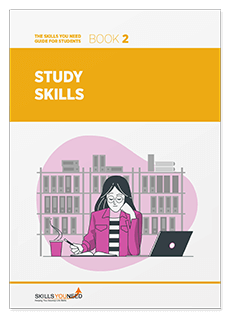Fast-Track Motivation:
7 Soft Skills for Accredited Online Degrees
See also: Self-Motivation
Struggling with managing your online degree program? Don't worry, this article is here to guide you. By tackling key soft skills like time management, technological proficiency, collaboration, and more, we're offering a roadmap to academic success. Get ready to learn top tips to evolve these skills and maximize the benefits of your online learning experience.
And the best part? A study revealed that 67% of HR professionals withhold job offers from qualified candidates due to a lack of soft skills. In short, by acquiring these soft skills, you not only enhance your online education but also set the groundwork for a successful career.

Boosting Productivity in a Distraction-Filled Environment
As an online student, minimizing distractions is crucial in maximizing your productivity. Before we delve into the soft skills, you need to prepare the following:
-
Set clear objectives: Define your study goal and develop your study sessions around it. Stay focused on these tasks.
Create a dedicated study space: Establish a quiet, clutter-free area to help you focus.
Implement time blocks: Dedicate blocks of time for studying and include short breaks to prevent burnout.
Use productivity tools: Use apps and software that enhance focus and aid in task management.
Minimize digital distractions: Turn off notifications or use the 'Do Not Disturb' mode during your study blocks.
Now that we've covered the basics, let's dive deeper into soft skills.
Top 7 Soft Skills to Get the Most Out of Your Online Education
1. Time Management
Balancing work, family, and studies can be a challenge, especially for online learners. Choosing degrees from accredited colleges can ease this process by offering flexible schedules and accelerated courses that allow you to complete your degree more quickly without compromising quality.
For those seeking fast online degrees from accredited colleges, time management becomes even more critical, as accelerated courses often require consistent dedication. Setting priorities and using tools to track progress can help students maintain their pace and reach graduation sooner, leading to quicker entry into rewarding careers.
Also, remember to prioritize tasks based on their importance and deadlines, and dodge procrastination by setting realistic, achievable goals. Over time, you'll notice your productivity improve, paving the way for academic achievements.2. Technological Proficiency
As an online student, you'll quickly see just how important tech skills are. You're in good company—about 70% of online learners notice a significant boost in their tech abilities during their studies.
Mastering technology helps you access materials, participate in online classes, turn in assignments, and communicate with your teachers and classmates. Here are five common apps that you'll likely use in online education:
-
Learning management system (LMS): A portal that hosts course content, it allows interaction between students and professors. The best LMS tools often include features for grading, announcements, and forums.
Video conferencing app: A platform for live online classes or group discussions, allowing participants to see, hear, and interact with each other from different locations.
Document sharing platform: An online service for storing, sharing, and collaborating on documents or files, essential for submitting assignments and working on group projects.
Task management tool: An application assisting in planning, organizing, and managing tasks, deadlines, and projects, boosting your productivity and time management.
Virtual whiteboard: A digital workspace usually incorporated into video conferencing apps, allowing for real-time collaboration, brainstorming, and note-taking during online classes or group discussions.
3. Collaboration & Teamwork
Teamwork and collaboration skills are vital to your online studies. Nearly 50% of online students report that they deepened their understanding of teamwork during their courses. Pairing up with fellow online learners does not just hone your collaboration prowess; it directly impacts your academic performance.
Online students who work in teams also enjoy a 17% higher course pass rate. Imagine sharing insights, swapping ideas, and solving problems as a unit, not only enriching your learning experience but also bolstering your success rate.
4. Self-Motivation & Self-Discipline
When you're working independently, it's crucial to kindle your inner discipline. Consider this scenario: You've got a tough project due in a week. Self-motivated students see it not as a hurdle, but as an opportunity to grow. They set a personal deadline, break down the task into manageable bits, and attack it, each step bringing them closer to their ultimate goal of project completion.
With solid self-discipline, you can resist the urge to put off tasks. You focus on the work at hand, a work ethic that'll give you an edge in any future workplace.
5. Adaptability & Flexibility
Having adaptability and flexibility means you can be nimble in responding to changes and challenges. Consider the common technical issues during a group project online. In this scenario, you need to switch platforms or even methods of collaboration rapidly, while maintaining focus on project objectives.
You must adapt smartly to new learning formats or fluctuating schedules, demonstrating flexibility in managing your tasks amid unexpected situations. Cultivating these soft skills empowers you to navigate the fluid world of online learning better and enhances your readiness for future work transformations.
6. Problem-Solving Ability
You'll find that 93% of employers regard problem-solving skills as a top priority, often overshadowing the importance of an undergraduate degree. Why? Because reality demands solutions, not just textbook knowledge.
For example, you might encounter technical glitches or schedule clashes in an online group project. Instead of panicking or passing the buck, take this as an opportunity. Employ your analytical abilities to determine the source of the issue, then devise innovative solutions.
Remember, a successful online student is not just about absorbing information but making a habit out of finding creative solutions to pressing problems.
7. Communication Skills & Overcoming the Fear of Public Speaking
Communicating effectively can be daunting, especially if public speaking makes you nervous. However, enhancing these skills is simpler than you'd think.
Start small. Engage in group conversations and gradually voice your opinions confidently. Practice with friendly crowds before dealing with larger or unfamiliar groups. Use tools like slide presentations or storytelling to transfer your thoughts.
To overcome the fear of public speaking, consider joining a public speaking class or seeking assistance from mentors. Remember, it's perfectly okay to feel anxious - the goal is to manage the nerves, not to obliterate them.

Drive Success with Soft Skills
It's clear, then, that achieving success in online education isn't just about mastering the curriculum—it's about honing vital soft skills that will enable you to get the most out of your learning journey. Whether it's managing your time effectively, easily adopting new technologies, building robust relationships with your virtual peers, navigating challenges independently, or speaking confidently in digital spaces, these skills can truly set you apart.
Explore continuous professional development courses, consider engaging in interpersonal skills training, or practice gamification techniques to foster these essential attributes. Embrace learning opportunities and developing effective soft skills is not an overnight process—it takes time, patience, and consistent effort.
Put these tips into practice and watch as your online educational experience improves.

About the Author
Imed Bouchrika, a Computer Science professor from the University of Southampton, UK, specializes in eLearning, image processing, and biometrics. He contributes to journals, conferences, and IT start-ups.

